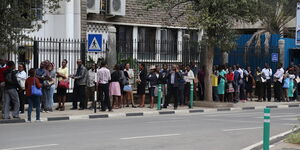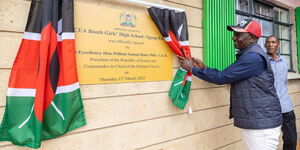Renowned international legal minds are seeking to be enjoined in the Building Bridges Initiative (BBI) appeal at the Supreme Court.
The five professors of law who are seeking to participate as amici - friends of the court - filed their applications on Monday, October 4. Among them are Richard Albert (US), Yaniv Roznai (Israel), Rosalind Dixon (Australia).
The other two are Professors David E. Landau (US) and Gautam Bhatia (India). These five experts will know whether their applications will be successful or not on Thursday, October 21, when the Supreme Court under Chief Justice Martha Karambu Koome convenes to issue directives on how the case would be heard.
US-based Prof Richard Albert argues that the BBI bill should have been argued as a constitutional dismemberment rather than a constitutional amendment as witnessed in both the High Court and the Court of Appeal.
Albert, an author of the famous legal book, Constitutional Amendments: Making, Breaking and Changing Constitutions based his argument on his belief that the BBI has proposed vast changes that will totally change the constitution.
If passed, all the laws in the country will either be affected directly or indirectly and most of them would require to be revised later on in line with the new constitution.
“That is not the work of a constitutional amendment. The Bill seeks to transform the Constitution of Kenya in a way that exceeds the boundaries of the existing constitution."
“The Bill is 45 pages in total, it contains 74 amendment articles, and it includes two Schedules appended to the main text,” he stated in his application.
The five legal minds also questioned the basic structure doctrine and that the power is vested upon the people to change the constitution and not the Parliament.
"As in other countries around the world, the express limitations and procedures found in Articles 255, 256 and 257 of the Constitution of Kenya 2010 are complements to a basic structure doctrine in Kenya, and in fact, provide support for the existence of a basic structure doctrine,” they jointly stated in their applications.
While upholding the ruling by the High Court that nullified the BBI, the Court of Appeal ruled that the basic structure doctrine is applicable in Kenya and that it limits the amendment power set out in Articles 255 – 257 of the Constitution.
“The basic structure of the Constitution can only be altered through the Primary Constituent Power which must include four sequential processes namely: civic education; public participation and collation of views; Constituent Assembly debate; and ultimately, a referendum,” Justice Daniel Musinga, Court of Appeal President read.
The six professors concurred with the Judges and differed with Attorney General, Paul Kihara Kariuki, who sought the Supreme Court’s directive on the basic structure doctrine arguing that the Appellate Court erred in its ruling.
Despite the six law experts playing cagey with their stand, it is seemingly evident that they are set to oppose the BBI ruling as seen from their arguments listed in their application.
Another factor adduced to explain their stand can be seen through Prof Richard Albert’s tweet in May 2017 when the BBI was nullified by the High Court.
Albert whose book, Constitutional Amendments: Making, Breaking and Changing Constitutions, was cited during the BBI arguments wrote: “A truly historic ruling in the High Court of Kenya: The "basic structure" of the Kenyan Constitution is unamendable."
“Congrats to the petitioners on their winning advocacy. And a pleasant surprise to see two of my books cited by the Court.”












